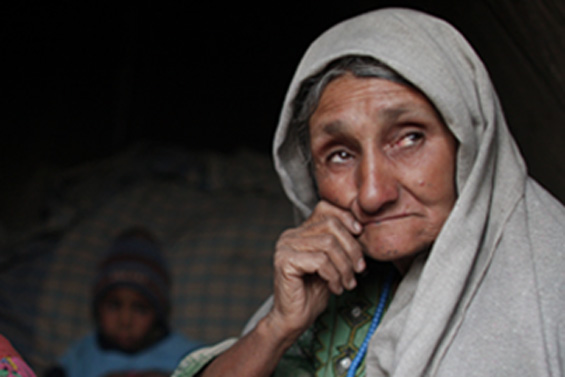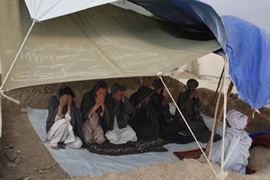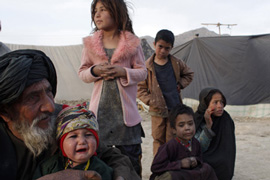Afghanistan’s refugee challenge
Experts say the repatriation of long-term exiles requires a new approach.

 |
| Many Afghan refugees are long-term exiles who have been in their host country for up to 30 years [GALLO/GETTY] |
With five million refugees repatriated since 2001 and three million still harboured mainly in Pakistan and Iran, Afghanistan continues to face formidable challenges in addressing the needs of its refugee population.
Increasing tensions between Afghanistan and its neighbours, especially Pakistan, and deteriorating security conditions within the country have dampened initial enthusiasms of the refugees’ homecoming.
Salvatore Lombardo, the United Nations High Commissioner for Refugees (UNHCR) country representative in Afghanistan, says a more challenging period lies ahead for the Kabul government and international agencies seeking the reintegration of refugee populations both within and outside Afghanistan.
In an exclusive interview with Al Jazeera, Lombardo said there is not enough recognition that a population that has been in exile for 30 years does not necessarily want to be repatriated.
“The aspirations they have, the wishes they have certainly do not find an answer in the Afghanistan of today and because of the insecurity many of them cannot go back to the places where they came from,” he said.
Injection of pragmatism
Lombardo says national and international repatriation efforts must be more pragmatic.
“What is required is a moment of truth to see what can be done and what cannot be done,” he said.
Ingrid Macdonald, the regional protection and advocacy advisor of the Norwegian Refugee Council, agrees, saying that refugees with ties to Afghanistan – such as property, assets, and family – have already come back.
She said: “[But] those who remain, many of whom have lived in Pakistan for over 25 years or were born there, have no access to land or property, are under 25 years of age or are elderly. Is it really legitimate for them to come back to Afghanistan now with all the challenges we face here?”
One of the integral challenges is that refugees considering repatriation may no longer identify with the Afghanistan they left.
For many, living in neighbouring countries has changed the way they dress and speak, and affected their status of education, their status as working women and their standard of living.
“Whereas their families may have come from a rural environment originally – that does not mean after 25 [years] of living in a camp or urban area that they have the ability or desire to return to that rural area,” Macdonald said.
Voluntary return principle
The new Afghanistan National Development Strategy (ANDS) presented by the Afghan government to donors in Paris in June stressed the principle of voluntary return and indicated that “the desire of neighbouring countries to engineer large scale return is a challenge to the principle of voluntary repatriation”.
But the strategy avoided making political statements on the possible integration of long-term exiles into their host countries.
Robbie Thomson, the interim country head of the International Organisation of Migration (IOM), says it is up to both the Iranian and Pakistani governments to decide whether to return Afghan refugees.
“Decisions on the fate of refugees are political decisions. The international community can have an input on the issue but may not necessarily be able to change the outcome.”
“Militant sanctuaries”
But Lombardo says the status of diplomatic relations between Afghanistan and its neighbours plays a critical factor in any repatriation effort.
 |
| Many refugees who returned are still living in tents in the desert [GALLO/GETTY] |
“The quality of that relationship will always influence the destiny of this population. When relations between states on issues like these are not very ideal there is no great will to discuss solutions,” he said.
“There needs to be trust. When that is not there it delays solutions, it complicates matters. This has always been the case for the Afghan presence in Pakistan. If the relationship does not go well the population hosted over there will suffer.”
Political constraints have often translated into increased hardships for many Afghan refugees and have often undercut the principle of voluntary return.
The Iranian government, for example, has said it has a “sovereign right” to deport refugees who have not registered with the UNHCR, branding them “illegals”.
Pakistan, under pressure from the international community to take action against cross border militancy, has claimed that the refugee camps in the border areas need to be dismantled since they have become sanctuaries for militants and that Afghans staying in those camps have carried out terror attacks.
Community pressure
But sometimes local communities who play host to refugee populations also apply pressure to convince Afghans to leave the area.
In Baluchistan, the largest province in Southwest Pakistan, the residents of the Zher Kareez camp found their water supply turned off, apparently at the behest of the locals.
In the North West Frontier province, the local jirga (council) accused the residents of being involved in illegal activities and asked them to leave.
Nevertheless, Lombardo feels that in general the generosity of the host populace has been extraordinary, saying “whatever the politics the human element has been quite exemplary”.
Pressure from UNHCR has slowed down the closure of camps and the rate of refugee return – just 200,000 have returned so far this year, which is far viewer than the mass returns of earlier years.
But the number of returnees continues to outpace the reintegration capacity in Afghanistan.
The initial euphoria expressed by refugees returning home has long since tapered off as they begin to struggle with the lack of land, homes, shelter, services and employment.
While the enduring poverty impacts all Afghans, refugees often find themselves more vulnerable without the links to subsistence structures that others have developed over time.
Promised land
Part of the problem, repatriation analysts say, is that the Afghan government promised land for every returnee.
“The dream that you are going to give a piece of land to everyone who comes back was false and certainly should never have been done and should not have been shared because that dream does not exist,” Lombardo said.
 |
| Many returning refugees may not be able to return to the place they left [GALLO/GETTY] |
The scarcity of land has meant that refugees are often allotted land 50km away from urban centres and usually in areas where refugees have no means of livelihood or family connections.
Macdonald also says that the land ownership claims are drawn out and have added further complications to repatriation.
“Of the two million refugees remaining in Pakistan – almost 90 per cent claim to have no claim to land or property in Afghanistan – along with insecurity, this will be one of the greatest challenges facing their return and reintegration in Afghanistan,” Macdonald said.
Thomson says: “When refugees or migrants are returned from Pakistan or Iran and come back to Afghanistan they may or may not be able to return to the point of origin. Local settlement is a second option but is not as easy as it sounds. There are land issues both qualitative and quantitative.”
Refocus
International relief organisations and various UN agencies dealing with refugees and their reintegration have said that much emphasis is placed on the initial stage of refugees’ return and not enough on issues which may later arise.
Repatriated refugees could end up in urban areas without adequate basic services such as shelter, water, food, healthcare and education facilities.
Many appear to end up living with extended families which can place enormous levels of pressure and stress on those communities.
“Tens of thousands of people who most recently returned from the Jalozai camp this year are still living in the desert, with makeshift tents made out of plastic and reliant on water tankers, months after they crossed the border into Afghanistan,” Macdonald said.
Some of the repatriated refugees find that they no longer fit into the social fabric they left behind long ago and choose to return to Pakistan or Iran in search of safety, work and basic services.
But Macdonald warns that refugees leaving Afghanistan once again do so illegally, which can make them vulnerable to extortion and exploitation.
To prevent such difficulties following repatriation, the attitude from international agencies and local governments must change.
“The difficulty is that they [the returning refugees] are looked at as a problem and not as a solution,” Thomson said.
“If we can demonstrate they bring something with them – skills or other benefits – it would make their return more welcome.”